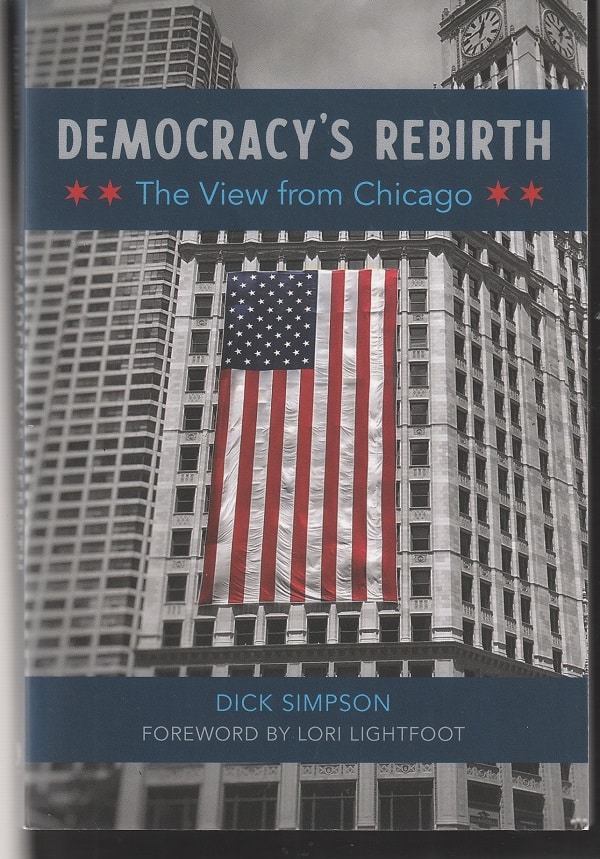A half a century ago, as a new political science professor at the University of Illinois at Chicago (UIC), Dick Simpson won election to the Chicago City Council for the city’s Near North Side 44th ward as an independent — twice!
While there, he was one of a handful of non-machine council members, vastly outnumbered by Mayor Richard J. Daley’s rubberstamp aldermen. As he notes, somewhat wryly in Democracy’s Rebirth, “Mayor Daley would chide me when I was a Chicago alderman, ‘you ain’t got the votes, kid.’ ”
During those years, Simpson managed an independent campaign in a nearby ward during which the candidate’s office was firebombed. He writes:
As they say in Chicago, “politics isn’t bean bag” — it isn’t a game, but political warfare with no holds barred.
The health and well-being of democracy
Democracy’s Rebirth is about politics and, even more, about the health and well-being of U.S. democracy. It is described by Simpson’s publisher as “a blueprint for repairing America’s imperiled democracy.” The author himself calls it “both a theoretical discourse and a practical manifesto.”
In many ways, it is a primer for citizen-voters and for students of government that uses Chicago as a case study — for bad and for good — and describes in a granular way how government, politicians and democracy work and the many challenges now before the nation. Because the book delineates very specific ways to address these challenges, it is somewhat akin to a binder of position papers for a newly elected public official, something Simpson helped prepare as a member of the transition team of Mayor Lori Lightfoot following her 2019 election.
As Simpson’s 22nd book, Democracy’s Rebirth is, perhaps above all, a summation of his half a century of writing and his unique careers as political candidate, elected official, campaign strategist, and government advisor. He writes:
I know how the sausage is made.

Polarization
For instance, in his chapter on the deep problems caused by hyper-polarization in the United States today, Simpson looks back on more than a half century of deep divisions in Chicago, starting with the way political leaders went about replacing Daley when he died of a heart attack on December 20, 1976.
As an alderman, Simpson had a ringside seat, attending at least one of the many aldermanic caucuses in the hours after the mayor was struck down. The partisanship, in this case, didn’t pit the Daley machine Democrats against the handful of independents and one Republican in the Council. Instead, it came down to race.
White Council members aligned with Daley’s political aides to block an African American alderman from becoming acting mayor. Race again as at the heart of the 1983 election when Harold Washington became the city’s first Black mayor despite being opposed by much of the regular Democratic organization, even to the extent of backing his Republican opponent.
Similarly, the resulting battle between the white leaders on the Council and Washington, known as Council Wars, was all about a struggle for power between racial factions.
Good news out of Chicago
Yet, when it comes to polarization, Chicago, Simpson writes, has become a source of good news. In recent years, “the century-long battle between order and innovation, political machine and reform movements, ethnic and racial divisions has swung toward progressive reform,” writes Simpson.
In an important sign of the city’s move toward a better future, “Chicagoans elected a Black, woman, lesbian mayor in 2019.” In another, the Council “has begun to act more like a legislating body while providing Mayor Lightfoot a governing majority.”
(Still another sign, although not mentioned by Simpson, has been the election of a handful of self-identified socialist aldermen, a sharp change from the past.)
Simpson is a fan of much of what Lightfoot did as a reform-minded mayor, such as eliminating aldermanic privilege in routine administrative matters, a veto power for a Council member that fragmented city government.
However, in the year since his book was published, Lightfoot was defeated in a bid for reelection. It remains to be seen how the policies of the new mayor Brandon Johnson, also a progressive, elected in April, 2023, will impact the reform movement of the city and the measures that Lightfoot implemented or put into motion.
Nuts and bolts
Throughout Democracy’s Rebirth, Simpson is very detail-oriented. He describes the nuts and bolts of what has been going wrong with American democracy, and he provides precise how-to instructions for fixing the problems and reinvigorating the democratic process.
Yet, as much as he is aware of the structures and policies that have gotten the U.S. where it is today, Simpson is ultimately focused on the importance of individual Americans. The fight for justice and democracy, he writes, is essential.
If we are to succeed, democracy requires a citizenry willing to participate and hold their government accountable. To sacrifice for the greater good.
As Simpson makes clear throughout his book, there are a great number of active citizens and leaders who are working to subvert democracy, as the January 5 insurrection showed. What are needed are voters and citizen activists who will counterbalance such authoritarian efforts. He writes:
We, the people, must shake off our apathy and rise up. We must understand, act, and act again until our democracy is reestablished on a sounder footing.
Patrick T. Reardon
4.30.24
This review originally appeared in the Journal of the Illinois State Historical Society, Volume 117, Number 1, Spring 2024
Written by : Patrick T. Reardon
For more than three decades Patrick T. Reardon was an urban affairs writer, a feature writer, a columnist, and an editor for the Chicago Tribune. In 2000 he was one of a team of 50 staff members who won a Pulitzer Prize for explanatory reporting. Now a freelance writer and poet, he has contributed chapters to several books and is the author of Faith Stripped to Its Essence. His website is https://patricktreardon.com/.
